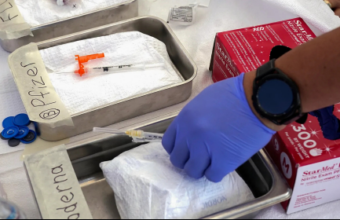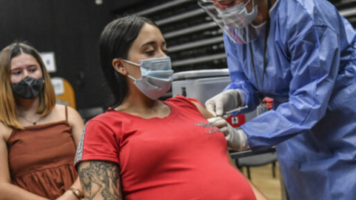COVID-19 News
COVID-19 Update | November 17, 2023
November 17, 2023

The California Biotechnology Foundation is committed to keeping you up to date about COVID-19 testing, treatment and prevention advancements. The following resources track what progress has been made as of November 17, 2023. Notable advancements include:
- A recent study from researchers at the Ragon Institute found getting a COVID-19 booster and flu shot together is more effective than separate.
- ACON laboratories’ over the counter home antigen test for COVID-19 is the first to be cleared by the FDA.
- In a recent study published in the Nature Aging Journal, researchers observed and shared that senolytic drug have shown promise in combating brain aging and COVID-19 neuropathology.
Recent News
- Your 2023 Holiday Season Guide to COVID-19, Flu, and RSV
Time – November 16, 2023
As you make your shopping list, plan travel, and schedule parties this holiday season, there’s something else you should add to your to-do list: making sure you’re up-to-date on the latest guidance around COVID-19, the flu, and RSV, as respiratory disease season hits full swing. “It’s always important to factor in the possibility of either transmitting an infection to other people or becoming infected, especially when getting together in large groups,” says Matthew Binnicker, director of clinical virology at the Mayo Clinic. “There are ways to safely gather and enjoy the holiday season,” but it requires taking the right precautions. - Getting COVID-19 and flu vaccines together is better, study suggests
The Guardian – November 15, 2023
Getting a COVID-19 booster and a flu shot together is better than getting them separately, a new study has found. The study, presented at an annual Vaccines Summit in Boston, involved two groups of Massachusetts healthcare workers. The first group of 12 received the bivalent COVID-19 booster and seasonal influenza shot together. The second group of 30 healthcare workers received the COVID-19 booster and flu shot on different days within the same month. The antibodies of both groups were then measured. The research concluded that the group that had their shots administered together had higher levels of immunoglobulin G1, or IgG1 – the antibodies that counter COVID-19 and that strain of influenza. - Experts Update Guidance on COVID-19 Treatment and Therapies
Pharmacy Times – November 15, 2023
New COVID-19 treatment guidelines recommend against the use of remdesivir and molnupiravir in patients with non-severe disease, in addition to providing risk categories to help physicians predict patients’ risk of severe disease. The updated guidance on treatments to aid individuals with COVID-19 was recently released by a team of international experts that represented the World Health Organization’s Guideline Development Group. - Senolytics show promise in combating brain aging and COVID-19 neuropathology
News Medical & Life Sciences – November 15, 2023
In a recent study published in the journal Nature Aging, an international team of researchers observed that senolytics can alleviate physiologic brain aging and COVID-19 neuropathology. Senolytics are a class of drugs that selectively target and eliminate senescent cells, which are cells that have stopped dividing and contribute to aging and age-related diseases. Most COVID-19 patients often experience diverse neurologic complications. Further, autopsied brain tissue transcriptomic data suggest associations between severe COVID-19 patients’ cognitive decline and brain aging signatures. - Autoimmune rheumatic disease patients benefit significantly from fourth COVID-19 vaccine dose
News Medical & Life Sciences – November 15, 2023
Patients with autoimmune rheumatic diseases, which include rheumatoid arthritis and other chronic disorders that cause inflammation, are at increased risk of a COVID-19 infection, as well as death due to severe COVID-19. Many patients receive disease-modifying antirheumatic drugs (DMARDs) to treat these conditions, but this treatment has been associated with a blunted response to COVID-19 vaccines. The U.S. Centers for Disease Control and Prevention recommends that patients receiving DMARDs receive a fourth dose of the mRNA vaccine in addition to the three-dose primary series to protect against COVID-19 to protect against COVID-19. - Substantial decrease noted in severe respiratory illness during first 2 years of pandemic
Center for Infectious Disease Research & Policy at University of Minnesota – November 15, 2023
Compared to the 3 years prior to the pandemic, children with medically complex conditions and otherwise healthy children saw decreases in severe non-COVID-19 respiratory illnesses in 2020 and 2021, the authors of a study note in JAMA Network Open. The cross-sectional study, based on 139,078 respiratory hospitalizations in Canada, shows that the mitigation efforts used during the first several months of COVID-19 likely prevented serious outcomes from respiratory illness complications, including hospitalizations, intensive care unit (ICU) admissions, and death. - COVID-19 increased gender life expectancy gap in US
Center for Infectious Disease Research & Policy at University of Minnesota – November 14, 2023
For more than 100 years, American women have outlived American men, largely due to differences in rates of cardiovascular disease and lung cancer. Now COVID-19 has widened the gendered life expectancy gap, according to a research letter published yesterday in JAMA Internal Medicine. The study was based on mortality data from the National Center for Health Statistics, and it compared life expectancy at birth between men and women from 2010 to 2021, divided by pre– and post–COVID-19 year, and cause-specific mortality. - Study: Hospital-based COVID-19 less serious after Omicron
Center of Infectious Disease Research & Policy – November 13, 2023
Hospital-acquired (nosocomial) COVID-19 transmission was associated with higher rates of 30-day mortality and more severe disease during the early phases of the pandemic, but the risk has lessened in the post-Omicron landscape, according to a new study from JAMA Network Open based on outcomes seen in Sweden during the past 3 years. Outcomes of nosocomial COVID-19 infections are important metrics for hospital prevention and control measures, including masking, ventilation, and mandatory testing of patients. - Study sheds light on role of antibodies in vaccine protection against COVID-19 variants
News Medical & Life Sciences – November 13, 2023
Efforts to contain the COVID-19 pandemic have largely focused on vaccine development and deployment. But how exactly do our immune systems respond to COVID-19 vaccines? The major response occurs in one of two ways: the production of antibodies that bind to the receptor-binding domain (RBD) or the production of antibodies that bind to the N-terminal domain (NTD) of the coronavirus viral spike protein. Both play important roles in preventing infection, pathogenesis, and severe disease. However, the antibody repertoire varies widely among individuals. - FDA clears its first OTC home antigen test for COVID-19. No, really
Fierce Biotech – November 10, 2023
No, you didn’t set your clocks too far back for the end of daylight saving time. This week, the FDA granted its first full, bona fide clearance to an over-the-counter home antigen test for COVID-19, and its first to carry an official 510(k) for use in children under age 18. Since 2020, the agency has granted emergency use authorizations to dozens of rapid, antigen-based coronavirus tests and hundreds of lab-based molecular diagnostics under its pandemic-era authorities. - Researchers Assess Innate Immune System Changes Following Severe COVID-19
Pharmacy Times – November 8, 2023
In a new study published in the journal Cell, researchers found that severe COVID-19 could trigger long-lasting alterations to the innate immune symptom, which is the initial defense against pathogens. The results of this study could explain why COVID-19 could cause damage to organs, along with why individuals that were diagnosed with long COVID displayed high levels of inflammation in the body. Following infection with COVID-19, individuals are at risk for long-term complications. Innate immune cell activation, combined with a delayed adaptive immune and interferon response, are often displayed in acute severe COVID-19. - California’s ‘tripledemic’ season is off to a mild start. What to know about flu, RSV and COVID-19
CalMatters – November 6, 2023
Influenza, respiratory syncytial virus (RSV) and COVID-19 are circulating this fall, but not yet at the rate that worried public health agencies a year ago. As we approach the time of winter when these diseases usually peak, around December to February, experts warn that the patterns can change at any time and advise people to take precautionary measures, such as getting vaccines. For those who are concerned about respiratory viruses, there is good news: the Food and Drug Administration approved two RSV vaccines and another shot for use in vulnerable populations. Several vaccine makers also have updated their COVID-19 boosters, which are recommended for those who are over age 5. Public health experts generally expect a milder flu season this year.
Rely on California Biotechnology Foundation to monitor breaking news and provide updates on the latest advancements in COVID-19 diagnostics, vaccines and treatments.
Stay informed on the latest news and trends on the economic and health benefits of this industry by visiting the new CABiotech.org
If you have any questions about hosting informational briefings for your colleagues serving in the legislature, contact California Biotechnology Foundation Executive Director Patty Cooper at (916)764-2434 or [email protected].


